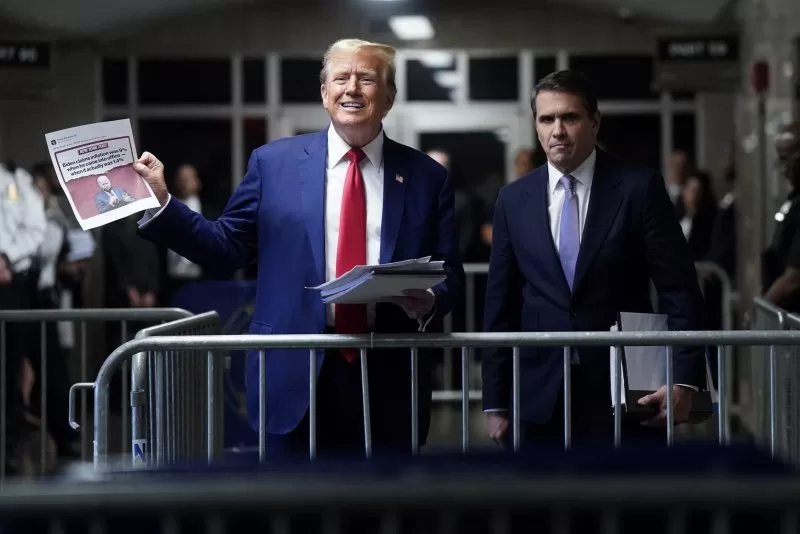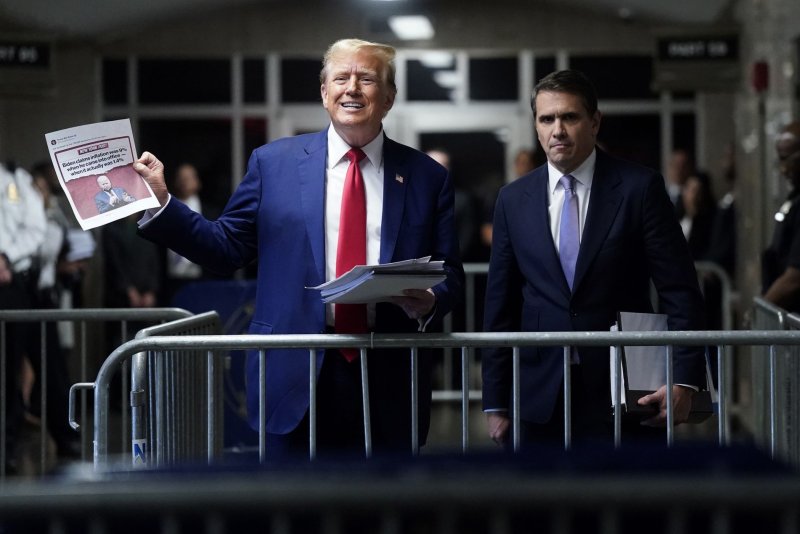1 of 6 | Former President Donald Trump speaks to reporters as he leaves for the day at Manhattan criminal court in New York on Friday, May 10, 2024. Trump’s criminal trial is in its fourth week on charges he allegedly falsified business records to cover up a sex scandal during the 2016 presidential campaign. Pool photo by Timothy A. Clary/UPI |
License PhotoMay 10 (UPI) — Former White House executive assistant Madeleine Westerhout’s testimony and a mountain of evidence wrapped up the fourth week of Donald Trump‘s hush money trial, as his former “fixer” Michael Cohen is expected to take the stand Monday.
Westerhout was first called Thursday by the prosecution as the fourth week of the trial comes to an end. The 33-year-old returned to the stand Friday morning.
The former president’s one-time executive assistant told the court Friday that Trump became “very upset” when the story about the alleged hush-money payments first became public.
“My understanding is that he knew it would be hurtful to his family. The whole situation was very unpleasant,” Westerhout told Trump attorney Susan Necheles during cross-examination in front of New York State Supreme Court Justice Juan Merchan.
Westerhout was in the White House when the story first broke.
On Friday, Westerhout testified that Trump would sign checks personally if he was present in the White House.
“If he had the time when you gave them to him he would sign them right away,” she said.
Necheles also probed Westerhout about Trump’s proclivity for personally signing documents without having first reviewed them while he was preoccupied with other tasks, which she said occurred “not every day, but sometimes.”
She also said that Trump was “definitely” a multitasker.
Westerhout also emphasized Trump’s desire to ensure it was his authentic signature and not a duplicate on any personal documents sent to people.
Trump’s lawyers also had Westerhout confirm the former president’s close relationships with former National Enquirer parent company CEO David Pecker, and ex-Trump Organization CEO Allan Allen Weisselberg. Weisselberg in March had pleaded guilty to perjury.
The rest of Friday’s proceedings involved entering evidence, which included phone records, payment records between Cohen and Trump and a series of messages between the manager for former adult film actress Stormy Daniels and Pecker about whether she would go public with her allegations about having an affair with Trump.
Merchan on Friday ruled that a 1999 Trump interview with Larry King about campaign finance laws could not be entered as evidence, siding with Trump’s attorneys that Trump’s views in 1999 were not relevant to his state of mind in 2016 or 2017.
Cohen’s cellphone was entered as evidence ahead of his testimony on Monday.
Trump attorney Todd Blanche pressed Merchan to put a gag order on Cohen after he posted a TikTok video this week of himself wearing a white T-shirt with a picture of Trump behind bars.
Prosecutor Joshua Steinglass said prosecutors have “repeatedly” asked witnesses not to talk about the case, but that they have “no control” over what witnesses do.
Merchan, regardless, told prosecutors to tell Cohen again to refrain from making further statements about the trial, and that the order is coming directly from the bench.
Trump is accused of falsifying business records to cover up payments to Cohen to compensate him for the hush-money payments to former adult film actress Stormy Daniels, who’s real name is Stephanie Clifford.
Earlier in the week, former Trump Organization executive Deborah Tarasoff testified, attempting to distance herself from allegations that she helped prepare 12 checks signed by Trump, each with a value of $35,000. Those were allegedly sent in 2017 to Cohen as reimbursement for payments already made to Daniels, as well as an additional $130,000 earmarked for Daniels, who has already testified during the trial.
Trump has continued to rail against the trial, calling it on Friday outside the courtroom “a disgraceful trial,” and a “tremendous abuse of the New York judicial system.”

